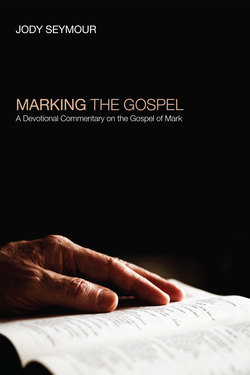Читать книгу Marking the Gospel - Jody Seymour - Страница 5
На сайте Литреса книга снята с продажи.
Preface
ОглавлениеSome animals are known to “mark” their territory. “X marks the spot” is a familiar saying, even to a child. The Greek word for sin is “harmatia,” which literally means “to miss the mark.” In this book I want to share in a journey with you in which we explore what it means to “mark” the Gospel. I want the hero of Mark’s Gospel to make a mark on you. I want for you to end up being a marked man or, to be inclusive, a marked person.
Each of us is marked by something. We bear the mark of parents who—hopefully—did the best they could, but who made the inevitable mistakes in attempting to shape a human being. We bear the imprints of a culture that seems to cry out to us that instant is better than long-lasting, entertainment is better than joy, now is better than later, fact is deeper than truth, and the material is better than the spiritual because it can be quantified.
Countering these messages from our culture are the Gospels and their call to a different way of life. The first book we know of that was written about the Christian way of marking life was a short bit of propaganda that we now call The Gospel of Mark. Most scholars believe it was the first Gospel written, and that it became the framework of the storyline for subsequent pieces of propaganda entitled The Gospel of Matthew and The Gospel of Luke.
Do not be upset by my use of the descriptive word “propaganda.” It is meant to help you understand that Mark and the other Gospels are not straightforward biographies of a famous man. The differences in the Gospel accounts are, in part, because each of the writers had a definite agenda to present, and a different audience on which they were trying to make their marks.
In modern-day terms, these Gospel accounts are loaded material. They do not pretend to be unbiased reporting. A slanted media is not a new phenomenon. Mark has a definite slant to his writing. What I want to do in this devotional commentary is to let that slant do its number on you. I want to let this slant make its mark on you, the reader.
The Gospel of Mark is meant to make an impression. It is not meant to be a general landscape in your life. It is meant to be a mark on the map. The power of Mark’s Gospel can be missed because of its brevity. However, since it was the first mark made, I think we ought to pay close attention to its power to transform.
I call this work a devotional commentary because we will look carefully at the details of what Mark is saying, but for the purpose of letting it make an impression on us. Study will be in the background, not the foreground of this work. One of the teachers I had during the course of my undergraduate education, Dr. Walter P. Weaver, has written a commentary on Mark. His commentary on Mark in the Basic Bible Commentary series is part of the underpinning of this devotional commentary. I have also used Lamar Williamson Jr.’s commentary on Mark in the Interpretation series as background study for this devotional commentary.
If you desire the scholarship piece of this work, then purchasing those commentaries, or ones similar, will be of help to you. My desire in this book is to help you experience the meaning of the text for yourself.
It is my belief that the true inspiration of Scripture is not just in the writing of it, but also in the encounter with it. I believe that, in some way, God has chosen to have inspiration happen in the space between reader and writer. Modern science tells us that the perception of an event actually determines the nature of that event. Is light a particle or a wave? It depends on how you attempt to observe it. The observing actually affects the reality. Light is both particle and wave.
So it is with Scripture about the one who came to be known as the “light of the world.” In Scripture a reality exists before we observe it, but something happens when we encounter its power. A cursory dealing with Scripture will miss its true reality. Spending time with the text and allowing it to mark you—that is the power of the inspired word of God.
So come with me on a journey of discovery. Pretend it is the first day of school and you are a child who has just bought that new pack of fresh paper. Remember the feeling of new beginnings. All things are possible. The pages are blank, ready for your impressions as you encounter new knowledge.
Could this earliest story of Jesus do that again for you? Can you perhaps feel the excitement of those who first hear the words: “The beginning of the gospel—the good news—of Jesus Christ, the Son of God”? Come with me and let us mark the Gospel. In so doing, I believe we will ourselves be marked.
